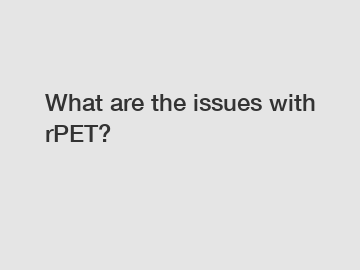What are the issues with rPET?
What are the issues with rPET? is rPET safe to use? Is rPET environmentally friendly? These are the questions that often surround the use of recycled polyethylene terephthalate (rPET) in various industries. While rPET offers potential benefits in terms of sustainability and resource conservation, it is not without its challenges. In this article, we will explore the key issues associated with rPET and evaluate its overall impact on the environment and human health.
1. Contamination and Quality Control:
One of the primary concerns with rPET is the potential for contamination. The recycling process may introduce impurities and residues from the original product, such as food or beverage containers. Maintaining strict quality control during the recycling process is essential to ensure that the resulting rPET is safe for further use. It requires robust sorting and cleaning procedures to minimize contamination risks.

2. Chemical Additives:
To meet specific technical requirements, rPET often undergoes additional chemical processes and additives. These additives can include stabilizers, colorants, or other substances that improve the properties of rPET. However, concerns arise regarding the safety of these additives and their potential impact on human health and the environment. Proper evaluation and regulation of these additives are crucial to mitigate any harmful effects.
3. Energy and Water Consumption:
While recycling plastics like PET reduces the demand for virgin materials and decreases waste accumulation, it is not a completely energy-efficient process. The recycling of plastics, including rPET, requires energy-intensive operations such as collection, sorting, cleaning, and processing. It also requires significant water usage. Finding ways to minimize energy consumption and optimize water use in the recycling process is essential to maximize the environmental benefits of rPET.
4. End-of-Life Management:
Recycled plastics, including rPET, must have a viable end-of-life management strategy to ensure their proper disposal or further recycling. Without effective management, rPET can end up in landfills or incineration facilities, leading to potential environmental hazards. Developing robust recycling infrastructures, encouraging consumers to participate in recycling programs, and promoting a circular economy are necessary steps to address this issue.
5. Consumer Awareness and Perception:
The success of rPET largely depends on consumer acceptance and demand. A lack of awareness among consumers about the benefits and safety of rPET may hinder its wider adoption. Furthermore, misperceptions or misinformation regarding the quality and performance of rPET can negatively impact its marketability. Educating consumers about the advantages and addressing any concerns they may have are crucial in ensuring the success of rPET as a sustainable alternative.
In conclusion, rPET offers potential environmental benefits by reducing waste and conserving resources. However, several issues need to be addressed to ensure its safe and sustainable use. Stricter quality control and monitoring are necessary to minimize contamination risks. Evaluating the safety of chemical additives and optimizing recycling processes can further enhance the sustainability of rPET. Moreover, improving end-of-life management and raising consumer awareness about the advantages of rPET are crucial steps towards a more resource-efficient and environmentally friendly future.
For more rPET pellets, rPET pellets, rPET pelletsinformation, please contact us. We will provide professional answers.
52
0
0

Comments
All Comments (0)